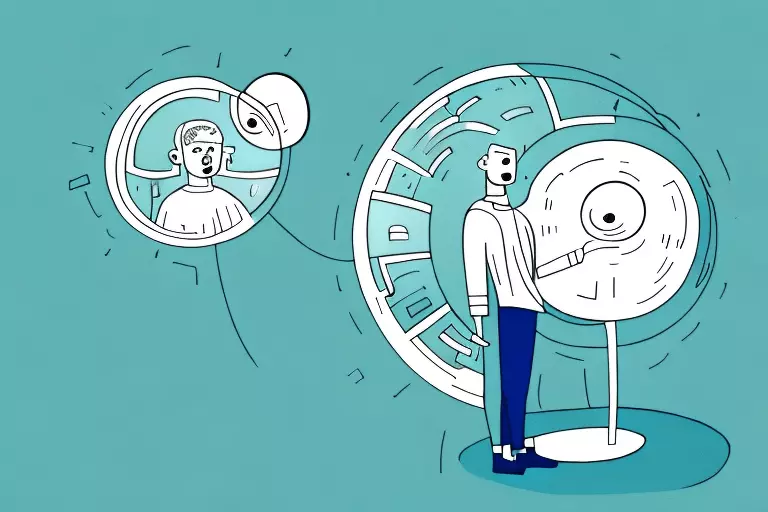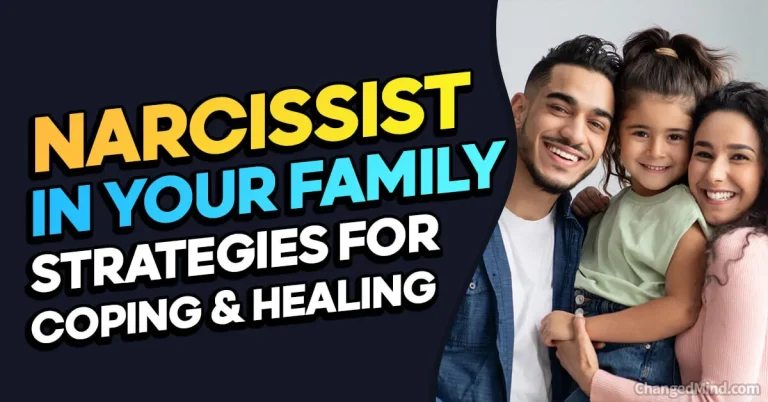Welcome to the fascinating world of overt narcissists!
In this article, we will delve into the depths of their self-absorbed universe, shedding light on their behaviors, exploring their underlying causes, and equipping you with valuable strategies to effectively deal with them.
So, buckle up and prepare to embark on this enlightening journey!
What is Overt Narcissist?
An overt narcissist is the star of their own show, displaying an exaggerated sense of self-importance that rivals even the most impressive fireworks display. These individuals crave constant admiration and validation, seeking to be the center of attention wherever they go. They possess an unquenchable thirst for power, control, and adoration.
Importance of Recognizing and Understanding Overt Narcissism
Recognizing overt narcissism is crucial for safeguarding your well-being and maintaining healthy relationships. By understanding their behaviors, motives, and the effects they can have on your life, you can navigate their treacherous waters with confidence and protect yourself from potential harm. Knowing what you’re dealing with empowers you to set boundaries and make informed decisions.
Brief Overview of the Article’s Content
Throughout this article, we will take a comprehensive dive into the world of overt narcissists. Here’s what you can expect:
- Signs of an Overt Narcissist: We will explore the telltale signs that unveil the true nature of overt narcissism. From their grandiose sense of self-importance to their manipulative tactics, we’ll leave no stone unturned.
- Real-Life Examples of Overt Narcissism: To bring these concepts to life, we’ll examine famous celebrity cases and explore scenarios in the workplace and personal relationships. These examples will shed light on the impact overt narcissists can have in various contexts.
- Causes and Contributing Factors: We’ll delve into the psychological origins of overt narcissism, examining how childhood experiences and sociocultural influences contribute to the development of these traits. By understanding the causes, we can gain insights into why overt narcissists behave the way they do.
- Dealing with Overt Narcissists: Armed with knowledge, we’ll equip you with practical strategies for navigating interactions with overt narcissists. From setting boundaries and practicing effective communication to seeking support and assessing the need for distance, we’ve got you covered.
Now that we’ve set the stage, let’s dive right in and explore the fascinating world of overt narcissism!
Signs of an Overt Narcissist

Now that we have a clear understanding of what an overt narcissist is, let’s shine a spotlight on the unmistakable signs that can help you identify these self-absorbed individuals. Keep your detective hat on and pay attention to the following behaviors:
Grandiose Sense of Self-Importance
Overt narcissists view themselves as the crème de la crème, the ultimate embodiment of perfection. They believe they are entitled to special treatment, admiration, and unwavering attention. You’ll notice their grandiose sense of self-importance in the way they speak, act, and carry themselves.
Tip: Remember, confidence is one thing, but an excessive sense of superiority is a red flag.
Constant Need for Admiration and Validation
Overt narcissists thrive on being the center of attention and bask in the spotlight of adoration. They require a continuous influx of praise, compliments, and admiration to fuel their insatiable ego. They’ll go to great lengths to seek validation, often fishing for compliments and expecting others to cater to their every need.
Tip: Don’t be fooled by their hunger for attention; genuine humility is far from their repertoire.
Lack of Empathy and Inability to Consider Others’ Feelings
When it comes to empathy, overt narcissists are sorely lacking. They struggle to understand or genuinely care about the emotions and experiences of others. It’s as if their emotional radar is set to “self-centered” mode, leaving little room for empathy and compassion.
Tip: Keep an eye out for their dismissive attitude towards your feelings and the feelings of those around you.
Exploitative Behaviors and Manipulation Tactics
Overt narcissists have a knack for manipulation. They use others as pawns in their grand game of self-gratification. They excel in exploiting people’s vulnerabilities, twisting situations to their advantage, and using charm to get what they want. Beware of their cunning maneuvers and subtle coercive tactics.
Tip: Trust your instincts and be cautious of individuals who always seem to have an ulterior motive.
Expert Says
Laurie Hollman, PhD
Licensed Psychoanalyst, Choosing Therapy | Author, “Are You Living with a Narcissist?”.

Sense of Entitlement and Belief in Special Privileges
Overt narcissists firmly believe that the world owes them everything on a silver platter. They expect preferential treatment, special privileges, and unquestioning obedience. This entitlement can manifest in various ways, from cutting in line to expecting unwavering loyalty and submission from others.
Tip: Stand your ground and remember that everyone deserves equal respect and consideration.
Fragile Self-Esteem and Susceptibility to Criticism
Paradoxically, behind their façade of self-assuredness lies a fragile self-esteem. Overt narcissists are surprisingly sensitive to criticism and rejection. Even the smallest hint of disapproval can trigger an explosive response as they fiercely defend their inflated self-image.
Tip: Approach criticism with caution and be prepared for potential outbursts or defensiveness.
Intense Jealousy and Envy Towards Others
Overt narcissists can’t bear the thought of others outshining them or stealing their spotlight. They harbor intense jealousy and envy towards those they perceive as rivals or threats to their superiority. They’ll go to great lengths to undermine others’ achievements and boost their own ego.
Tip: Don’t let their envy dampen your own accomplishments. Celebrate your successes without apology.
Domineering and Controlling Tendencies
Overt narcissists have an insatiable thirst for control. They seek to dominate every aspect of a relationship or situation, ensuring that they remain the one calling the shots. They’ll employ various tactics, such as micromanaging, belittling, or using emotional manipulation, to keep others under their thumb.
Tip: Recognize the importance of autonomy and assert your own boundaries to maintain a healthy balance.
By familiarizing yourself with these signs of an overt narcissist, you’ll be better equipped to navigate their turbulent waters. Stay tuned as we delve further into the world of overt narcissism, exploring real-life examples and unraveling the underlying causes of this intriguing personality trait.
Real-Life Examples of Overt Narcissism
Let’s step into the realm of real-life examples to gain a deeper understanding of overt narcissism. By exploring celebrity cases, workplace scenarios, and personal anecdotes, we’ll uncover the impact and implications of encountering individuals with overt narcissistic behavior.
Celebrity Cases Showcasing Overt Narcissistic Behavior
Even in the glitzy world of fame and fortune, overt narcissism can rear its self-absorbed head. Take for example the renowned musician who demands an entire hotel floor to themselves, or the actor who insists on being addressed only by their self-proclaimed title. These grandiose displays of entitlement and an insatiable need for admiration are telltale signs of overt narcissism.
Did you know? Studies have shown a higher prevalence of narcissistic traits among celebrities compared to the general population, given the attention and adoration they receive.
Workplace Scenarios and the Impact of Overt Narcissists
The office can sometimes be a breeding ground for overt narcissists. Picture the boss who dismisses ideas and suggestions from their team, insisting that their way is the only way. They thrive on power and control, often leaving a trail of demoralized employees in their wake. The toxic effects of an overt narcissistic boss can stifle creativity, hinder collaboration, and create a hostile work environment.
Statistical Insight: According to a study conducted by the Workplace Bullying Institute, 61% of workplace bullies are bosses who exhibit narcissistic traits.
Personal Anecdotes Illustrating Encounters with Overt Narcissists
Many of us have encountered overt narcissists in our personal lives, and these encounters can leave lasting impressions. Perhaps you’ve come across a friend who monopolizes conversations, turning every topic back to themselves. Or maybe you’ve had a partner who constantly belittles your accomplishments to maintain their sense of superiority. These personal anecdotes serve as reminders of the emotional toll overt narcissists can take on our well-being.
Analogical Insight: Dealing with an overt narcissist can be like trying to hold a conversation with a mirror—everything reflects back to them.
By exploring these real-life examples, we gain a clearer picture of the impact of overt narcissism across different domains. Whether it’s in the glitzy world of celebrities, the confines of the workplace, or the intimacy of personal relationships, recognizing and understanding overt narcissistic behavior is key to protecting ourselves and fostering healthier connections.
Stay tuned as we delve deeper into the causes and contributing factors behind overt narcissism. Understanding the roots of this personality trait can provide valuable insights and shed light on why some individuals exhibit such self-centered behavior.
Overt Narcissist vs Covert Narcissist
In our exploration of overt narcissism, it’s important to distinguish it from its counterpart: covert narcissism. While both types share similar traits, they exhibit their narcissistic behaviors in distinct ways.
Overt Narcissist: The Spotlight Seeker
An overt narcissist is like a peacock displaying its feathers to captivate an audience. They crave attention and admiration, showcasing their grandiose sense of self-importance openly. Their need for constant validation and admiration is evident in their interactions and behaviors.
Example: An overt narcissist may dominate conversations, steer attention to themselves, and seek out opportunities to be in the limelight.
Covert Narcissist: The Stealth Operator
On the other hand, a covert narcissist operates in a more subtle and hidden manner. They may appear humble, even shy, but beneath the surface lies a deep-seated need for admiration and entitlement. Covert narcissists tend to mask their grandiosity and seek validation through more covert means.
Example: A covert narcissist may employ manipulation tactics like guilt-tripping or playing the victim to elicit sympathy and attention.
Understanding the distinction between overt and covert narcissism helps us identify and navigate different types of narcissistic behavior. Both types can be equally damaging to relationships and individuals involved, but their methods of manipulation and seeking admiration differ.
Remember, the spectrum of narcissistic traits and behaviors is vast, and individuals may exhibit a combination of overt and covert tendencies. Stay vigilant, trust your instincts, and use your newfound knowledge to protect yourself from the clutches of narcissistic individuals.
Causes and Contributing Factors
To truly understand overt narcissism, we must dive into the complex web of its causes and contributing factors. Let’s explore the psychological origins, the role of childhood experiences, sociocultural influences, and the correlation with narcissistic personality disorder.
Psychological Origins of Overt Narcissism
Overt narcissism often finds its roots in deep-seated psychological factors. Researchers suggest that some individuals may develop overt narcissistic traits as a defense mechanism to mask underlying feelings of insecurity and low self-esteem. By projecting an image of grandiosity and superiority, they attempt to protect themselves from potential rejection or criticism.
Expert Insight: Psychodynamic theories propose that overt narcissism may arise from unresolved childhood conflicts or emotional wounds.
Role of Childhood Experiences in Shaping Overt Narcissistic Traits
Childhood experiences play a significant role in shaping the development of overt narcissistic traits. Growing up in an environment where one’s accomplishments are constantly praised while their flaws are overlooked or denied can foster a sense of entitlement and reinforce a grandiose self-image. Additionally, experiencing neglect, emotional abuse, or inconsistent parenting can contribute to the development of narcissistic tendencies.
Scientific Study: A study published in the Journal of Personality and Social Psychology found a correlation between overvaluation during childhood and the subsequent development of narcissistic traits in adulthood.
Sociocultural Influences on the Development of Overt Narcissism
Our sociocultural environment can also influence the emergence of overt narcissism. In a society that places high value on material success, appearance, and personal achievement, individuals may be driven to adopt narcissistic behaviors in pursuit of social status and validation. The constant exposure to social media, where self-presentation is carefully curated, can further fuel narcissistic tendencies.
Cultural Insight: Studies have found higher levels of narcissistic traits in societies that prioritize individualism and materialistic values.
The Correlation between Narcissistic Personality Disorder and Overt Narcissism
It’s important to note the relationship between overt narcissism and narcissistic personality disorder (NPD). While not all individuals with overt narcissistic traits meet the diagnostic criteria for NPD, there is a significant overlap between the two. NPD is characterized by a pervasive pattern of grandiosity, need for admiration, and lack of empathy. Overt narcissism can be seen as a manifestation of these traits in a less extreme form.
Clinical Perspective: According to the Diagnostic and Statistical Manual of Mental Disorders (DSM-5), NPD is diagnosed when an individual exhibits a consistent pattern of overt narcissistic behavior across different contexts.
Understanding the causes and contributing factors behind overt narcissism allows us to approach this complex personality trait with empathy and a deeper appreciation for its origins. It also highlights the importance of addressing the underlying psychological factors and providing support for individuals struggling with narcissistic tendencies.
In our next section, we will equip you with practical strategies for effectively dealing with overt narcissists. Stay tuned to learn valuable techniques to navigate their self-centered world with confidence and resilience.
Dealing with Overt Narcissists
Now that we have a solid understanding of overt narcissism, it’s time to equip ourselves with effective strategies for dealing with these self-absorbed individuals. Remember, you hold the power to protect your well-being and maintain healthy boundaries. Let’s explore practical ways to navigate the tumultuous waters of interacting with overt narcissists.
Setting Boundaries and Asserting Your Needs
Establishing clear boundaries is essential when dealing with overt narcissists. Communicate your limits and expectations firmly and assertively. Remember that it’s okay to say “no” and prioritize your well-being.
Tip: Practice self-advocacy and assertiveness by using “I” statements to express your needs and preferences.
Maintaining Self-Care and Self-Esteem
Caring for yourself is paramount when dealing with overt narcissists. Nurture your physical, emotional, and mental well-being. Engage in activities that bring you joy, surround yourself with positive influences, and practice self-compassion.
Analogical Insight: Just as an oxygen mask on an airplane is crucial for your well-being before assisting others, prioritize your own self-care before dealing with overt narcissists.
Practicing Effective Communication Strategies
When communicating with overt narcissists, it’s important to choose your words wisely. Focus on clear and direct communication, staying calm and composed. Use objective observations and assertive language to express your concerns or address conflicts.
Tip: Use “I” statements to express how their behavior impacts you, rather than placing blame or making accusatory statements.
Utilizing Techniques to Disarm Manipulation Attempts
Overt narcissists are skilled manipulators, but you can protect yourself by becoming aware of their tactics. Educate yourself on manipulation techniques such as gaslighting, hoovering, or silent treatments. By recognizing these tactics, you can minimize their effectiveness.
Expert Insight: Journaling your experiences and conversations with overt narcissists can help you gain clarity and recognize patterns of manipulation.
Seeking Support from Friends, Family, or Professionals
Dealing with overt narcissists can be emotionally draining, so don’t hesitate to seek support. Share your experiences with trusted friends, family members, or a therapist who can provide guidance and offer a fresh perspective.
Statistic: According to research, seeking support from others can help improve psychological well-being and reduce the negative impact of narcissistic relationships.
Assessing the Need for Distancing or Ending the Relationship
In some cases, the best course of action may be to distance yourself or even end the relationship with an overt narcissist. Evaluate the extent to which their behavior affects your overall well-being and consider whether the relationship is healthy and mutually beneficial.
Tip: Remember, it’s not your responsibility to change or fix an overt narcissist. Focus on your own well-being and make decisions that prioritize your mental health.
By implementing these strategies, you can navigate interactions with overt narcissists more effectively, maintain your own well-being, and protect your boundaries. Remember, dealing with narcissistic individuals can be challenging, but you have the strength and resilience to overcome these hurdles.
In our concluding section, we’ll recap the key points discussed and provide some empowering closing thoughts. Stay tuned!
Conclusion
Congratulations! You’ve successfully navigated the labyrinth of overt narcissism and gained valuable insights into recognizing, understanding, and dealing with these self-absorbed individuals. Let’s recap the key points we’ve covered and leave you feeling empowered.
Recap of the Key Points Discussed
Throughout this article, we explored the fascinating world of overt narcissism. We learned that overt narcissists have an exaggerated sense of self-importance, constantly seek admiration, lack empathy, and use manipulative tactics.
We examined real-life examples, from celebrities to workplace scenarios and personal anecdotes, to see how overt narcissistic behavior impacts different aspects of life.
We also explored the causes and contributing factors behind overt narcissism, including psychology, childhood experiences, and sociocultural influences.
Lastly, we provided practical strategies for dealing with overt narcissists, such as setting boundaries, effective communication, and seeking support.
Empowerment through Knowledge and Understanding
Knowledge is power when it comes to dealing with overt narcissists. By understanding their behaviors and motivations, you gain the upper hand in protecting your well-being and maintaining healthy relationships.
Recognizing the signs of overt narcissism empowers you to set boundaries and navigate their manipulations with confidence. Remember, you have control over your own life and happiness.
Encouragement to Implement Strategies for Dealing with Overt Narcissists
Now it’s time to put your knowledge into action. Be courageous in asserting your boundaries, practice effective communication, and prioritize self-care. Seek support from trusted individuals who can offer guidance and a listening ear. Dealing with overt narcissists may be challenging, but you have the strength and resilience to protect yourself and thrive.
As you continue on your journey, encountering overt narcissists along the way, remember that you are not alone. Reach out to others who understand and support you. Keep expanding your knowledge, nurturing your self-worth, and cultivating healthy relationships.
Remember, you have the power to shape your own narrative and create a life free from the grip of overt narcissism. Stay empowered, stay true to yourself, and always trust your instincts.
Wishing you strength, resilience, and fulfilling relationships on your journey.
Stay tuned for more insights and practical advice on navigating the intricacies of human psychology and relationships. Until next time!
FAQ
What are some red flags to look out for in identifying an overt narcissist?
Keep an eye out for signs like a grandiose sense of self-importance, constant need for admiration, lack of empathy, and manipulative behaviors.
How can I deal with an overt narcissist in a workplace setting?
Set clear boundaries, maintain professionalism, and document instances of manipulation or mistreatment. Seek support from trusted colleagues or supervisors when needed.
Can an overt narcissist change their behavior?
While change is possible, it is rare for an overt narcissist to undergo significant transformation without professional intervention and a genuine desire for self-reflection.
How do I protect my self-esteem while dealing with an overt narcissist?
Prioritize self-care, surround yourself with a support system, and remind yourself of your own worth. Engage in activities that boost your self-esteem and practice self-compassion.
Is it necessary to cut off ties with an overt narcissist?
Depending on the situation and the level of toxicity, distancing or ending the relationship may be necessary to preserve your well-being. Assess your own needs and make a decision that prioritizes your mental health.

Disclaimer
This information is for educational purposes only and is not intended to be a substitute for clinical care. Please consult a health care provider for guidance specific to your case.






